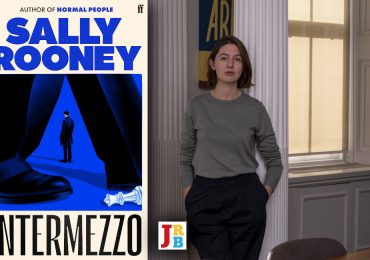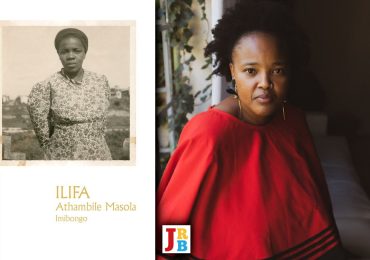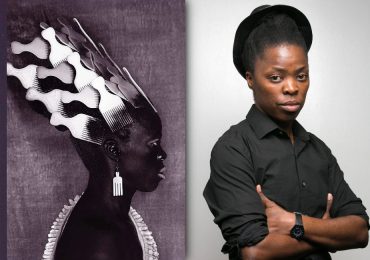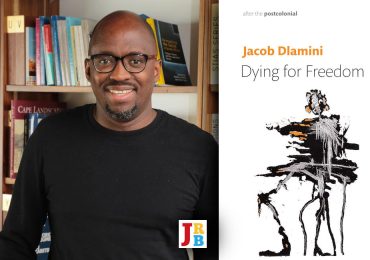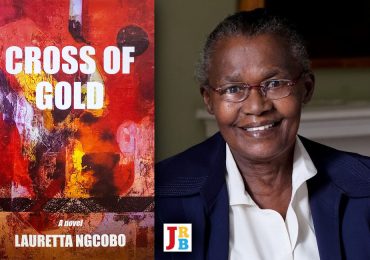The JRB presents a short story by Masande Ntshanga, never before published in English outside of the limited edition chapbook Native Life in the Third Millennium.
teachers
Luvo and I were colleagues at a university in the Eastern Cape, stationed in a small town downstream from a dead dam. This was during the tenure of a senior official who’d funnelled a fortune’s worth of donations into a private bank account, splitting it between members of staff. The funds were meant to build a new library wing, but the heist had invited the press onto our campus, which is how Luvo and I met Lelethu. There’d been a meeting in which the senior official’s name hadn’t been mentioned, but instead, we’d all been coerced into a plan of tactical evasion.
It wasn’t uncommon: our dean, who had a daughter at the hospital with a failing lung, had been implicated in a scheme before.
Most of us had seen the inside of her house.
Luvo was outside lighting a cigarette when his gaze locked on mine. He shook his head and I smoked when he offered me one.
He was new.
Like I was.
I told him my name and we shook hands; both of us Masters grads from different cities; associate lecturers. Tutors in philosophy and politics. I stood next to him and smoked.
—Let’s stop working here, he said, and I laughed.
—There’s no work elsewhere.
—True. He flicked his cigarette butt over the concrete. —To think that I planned coming here.
It was overcast and we were walking towards the square. Emptied, it would be crowded with students in an hour’s time. Luvo opened his jacket and showed me a nip of bourbon. It wasn’t the first bottle I’d seen at work. —I don’t live far from the campus, he said, pocketing it. —This helps with the cold weather.
I didn’t disagree with him.
—Let’s have a sit down, he said. —There’s nothing to do here and no one to do it with.
That’s how we became friends.
I drove to his flat that evening with a second bottle.
Hungover the following morning, I heard a woman laughing in his office. Luvo’s door was open and I was walking past it when he called for me. —This is Lelethu, he said. —From the papers. I showed her what I have in the bank.
I looked at him and he grinned and picked up his phone and showed me the log-offscreen on his banking app.
Lelethu leaned against his desk, tilting her head, her gaze locking on mine.
The woman was stunning, I thought, before I took out my phone and opened my banking app and showed her what I had in it.
Luvo laughed. —He doesn’t disappoint, does he? He’s an adventurer, like I said.
Lelethu smiled, giving me the approval I wanted from her.
—That’s two names off the list, she said, before she was gone. I looked at him, after she left, and Luvo laughed.
—I told her all the stealing sickened me and she asked me to prove it and I proved it. I don’t see what the problem is.
He grinned, leaning forward.
—Here for the weekend. From Johannesburg. Has a friend with her – a doctoral student. I invited them over.
—Impressive.
—I meant it. I’m on their side. How’s the head?
—In pieces.
He laughed and pulled out two cups from his desk drawer, boiling us water for coffee. —Let’s smoke.
The students languished on the square outside. The horizon broke into a sheet of clouds, caging the world inside a wall of silver.
I had a lecture, two tutorials, and the third of a seminar on Mabogo Percy More to write. Then I drove to meet Luvo at one of the two bottle stores we had in town, next to the butcher’s, and parked across a forecourt that was thinning to dust. From behind the wheel, all the buildings looked half-built. The disrepair wasn’t pronounced as much as it was a feature of the region, connecting the buildings on campus to hospitals and schools. It was a town of several thousand, built against the bank of an endangered river, with a single road marking the CBD. During apartheid, the province had been divided into two homelands, both of which had formed part of a larger mass, spread across the republic, meant to accommodate native men, women and children – cramming seventy-five percent of the population into thirteen percent of the land. Underindustrialised and overpopulated, the homelands were quick to give in to poverty and environmental degradation, both of which would persist far into their future. I got out of the car and looked for Luvo.
Factories stood abandoned on the horizon, their windows shattered. Men lined the street corners, shaded under trees, waiting for work as women hawked wares on cardboard tables, seated on plastic beer crates, taking cover under awnings and faded parasols.
In between them, children returned from school holding hands, dressed in sunwashed uniforms, relieved to be released from the confines of crammed and collapsing classrooms.
The survivors of the homelands were now at the helm of our government, manning a machine built to concentrate power in the hands of the few, and their performance at it was dismal, Luvo said, reeling from the trauma of colonial contact, which was now manifest in them as fear and avarice. In the previous month, a municipal manager had been arrested, slithering out in full view of us townsfolk. The man had been tasked with surfacing the roads, but instead, had hired associates, charged an additional million, and left the work undone. The ten million rand allocated to the budget was declared lost, leaving the area as it was. Luvo stood over the dust, waving his arms at me. There were children bouncing on a worn tyre next to him, laughing.
He lived alone. I parked in a slot below his flat and the two of us unloaded the booze and meat, exchanging clipped stories about postgrad and what had thrown us out of the cities. I wasn’t as impressive as he was, but the stories we told both intersected at debt and race. He balanced a six-pack of beer over the balustrade and looked for his keys. —It’s like this, he said, a potential side-effect of being black and depressed is losing the motivation needed to keep deceiving racist institutions about them being racist institutions. He got the door open and picked up the six-pack. —It’s a lethal condition. It means interviews and applications are dismal, which doesn’t help, since interviews and applications are what’s needed for medical aid, and medical aid is what’s needed for …
—Depression, I said.
—Right.
I knew what he meant. In the cities we’d left behind, institutions of higher learning were unwilling to divest from foundations descended from eugenicists. The sentiment was shared amongst the powerful; connecting professors, department heads, deans, vice-chancellors, and donors – all of whom had allotted a stigma around decolonial thought. In order to survive, we had to deceive them about being content inside their confines. —The lie provides sustenance for the scholar, but the research requires the truth, Luvo said. —Feigning false consciousness, and then balancing that against the demands of radical research, was an act I couldn’t see through when I was depressed. I lost the mask I needed for it.
He waved a hand at his door and I walked in.
It wasn’t much. He lived in a small flat on the second floor of a squat building next to an auto shop. It was in the CBD, and inside, the rooms were aged, each furnished in line with apartheid. Luvo hadn’t done up the place like I hadn’t done up mine.
I’d replaced the mattress and bought a chair and desk. Pulled down the lace curtain and thrown out the doilies and mop.
Dusted it.
He threw the meat into the basin to thaw and opened a beer for both of us. He was making lamb stew and dumplings, he said.
The women were arriving soon. Luvo pulled a second six-pack out of the freezer and we downed two more beers. I felt lighter.
There was a knock on the door and I got up.
—It’s the weed, he said. I sat back down.
—I like Lelethu, I told him, when he walked back in.
—Me too.
He sat across from me, sorting the seeds from the weed. The last of the sunlight crossed his torso, spilling across the couch.
—That was brilliant, I said. —Letting her see our balances.
—I almost did more.
—For justice?
—For her.
I believed him from the humour he’d left out of his voice.
I leaned back on the couch.
The air trapped inside the room when the windows were closed, giving it the damp heft of a generation’s worth of cooking. Luvo was thirty-five and lived like a student and I was thirty-five and lived like a student, but that night, we felt like them, too. His phone rang and I could hear Lelethu’s voice in its speaker.
—This is Zolani, she said, introducing her friend at the door.
They’d arrived ten minutes later. Luvo invited them in and passed us drinks before he returned to the kitchen. Zolani crouched in front of the small bookshelf he kept in the living room.
—I’m exhausted, she said. —Is it cool if I take my shoes off?
I told her it was. Then I sat down on the couch with Lelethu seated across from me.
—How well do you know your dean? she said.
I didn’t.
I told her how she’d invited each of us to her house after we’d joined the faculty, but that it had stopped there.
—I see. No such luck on my side, she said. —I can’t reach her. I heard her daughter’s sick. Is that true?
—It is.
—Right. I decided against going to the hospital, this afternoon, but now I have enough for a report, but not enough to hold anyone accountable.
—I heard about the bank balances, Zolani said, looking up at me from the floor next to Luvo’s bookshelf. —That was impressive.
—I followed their lead, I said.
—Me too. Luvo returned from the kitchen, wiping his hands. —I followed hers. The food’s almost done.
Lelethu asked if she could smoke, before we ate, and we went outside and leaned against the balustrade and lit a joint. The sun was setting, washing a pink and orange beam across the horizon, and I followed it over the rusting roofs in the Alice CBD, tracing it forward to the gunmetal roads that coursed over the hills, spilling into hidden villages north. Luvo cued a station of lo-fi beats on his phone, linking it to a speaker in the lounge—and hearing him and Zolani talk about their research over the music felt like what it was, I thought. That we weren’t alone.
~~~
- Masande Ntshanga is a novelist, short story writer, poet and editor living in Johannesburg. He was born in East London, and graduated from the University of Cape Town, where he completed his Masters in Creative Writing under the Mellon Mays Foundation. He has received a Fulbright Award, a Civitella Ranieri Fellowship, and a Bundanon Trust Award. He the author of two novels and the chapbook Native Life in the Third Millennium, from which this story is excerpted, and the winner of the inaugural PEN International New Voices Award. He has written for Chimurenga, The LA Review of Books Quarterly Journal, MIT Technology Review and n+1.

